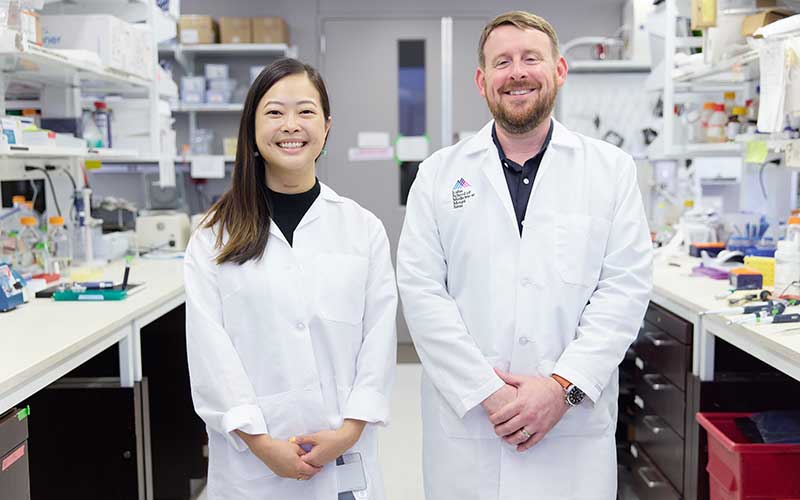
Jenneifer Chan, PhD, and Ian Maze, PhD
Jennifer Chan, PhD, whose work is vastly expanding knowledge about pregnancy, brain health, and stress, is the recipient of the 2022 Robin Chemers Neustein Postdoctoral Fellowship Award, established in 2010 to encourage and support female research scientists at the Icahn School of Medicine at Mount Sinai.
Recipients are senior postdoctoral scientists who intend to complete their training within two years, have demonstrated high-impact accomplishments in biomedical sciences, and exhibit the potential for an independent scientific career. Dr. Chan is the 23rd recipient of the award, created through a generous gift from Robin Chemers Neustein, JD, MBA, a former member of Mount Sinai’s Boards of Trustees.
Dr. Chan works in the laboratory of neurobiologist Ian S. Maze, PhD, in the Nash Family Department of Neuroscience. Dr. Maze, who was appointed as a Howard Hughes Medical Institute (HHMI) Investigator in 2021, is a Professor of Neuroscience, and Pharmacological Sciences, and the founding director of the Center for Neural Epigenome Engineering at Icahn Mount Sinai, the nation’s first center devoted exclusively to neuroepigenomic engineering.
Dr. Maze’s lab is focused on delineating the molecular and biochemical mechanisms of neuroepigenetic plasticity—changes in the underlying biochemical mechanisms that control whether genes are turned on or off within a given cell-type in the brain. This plasticity is important for allowing brain cells to appropriately respond to changing environments, which is critical for proper neurodevelopment—and which can cause disease when there is inappropriate tuning of gene expression.

Jennifer Chan, PhD
For example, aberrations in these processes can produce devastating neurological and psychiatric disorders, such as epilepsy, Parkinson’s disease, Alzheimer’s disease, substance use disorders, and major depressive disorders. These aberrations can occur during brain development or throughout life due to such factors as environmental toxins, physical trauma, chronic stress, and exposure to drugs of abuse.
The Maze lab—through the integration of technologically innovative and sophisticated new methodologies in chemical biology, proteomics, protein biochemistry/engineering, and structural biology—is advancing the understanding of these processes and working toward the development of targeted neurotherapeutics to treat these conditions.
“Using the most advanced epigenomic, metabolomic, and gene editing approaches in my lab, Dr. Chan is revolutionizing our understanding as to how environmental stimuli, both adaptive and maladaptive, impact epigenetic regulation of gene expression in the maternal brain to alter neural circuitry and behavior,” says Dr. Maze. “Delineating the mechanisms through which the experience of pregnancy imparts long-lasting changes in molecular and physiological properties of the brain promises to greatly aid in our understanding of how such a profound lifetime experience—shared by so many—contributes to brain health. Dr. Chan is an exceptionally talented and innovative young scientist, and I am absolutely thrilled by such prestigious recognition of her paradigm-shifting work.”
Dr. Chan joined the lab in 2018. Her research interests focus on understanding how biological systems outside the nervous system interact with stress to impact the brain during windows of neuroplasticity—times of active brain organization that are particularly susceptible to environmental and physiological challenges. Specifically, her work examines periods of early brain development and female reproductive experiences in rodents, including the long-term impact of pregnancy and postpartum experiences on the brain, and how stress disrupts normal organizational processes during these important windows.
“The experience of being pregnant dramatically changes both the body and brain,” says Dr. Chan. “While studies in patient populations and animal models have shown that these changes can persist long after giving birth, we still don’t understand the molecular mechanisms that control these processes.”
In particular, Dr. Chan investigates the contribution of epigenetic mechanisms underlying these experiences by combining molecular, biochemical, genome editing, and behavioral approaches in her postdoctoral research.
“The fundamental understanding of what reproductive experience does to the brain long-term has not been well studied,” says Dr. Chan. “My work shows that stress during these periods has a significant effect on the maternal rodent brain. I hope that through my research we can learn more about how pregnancy and postpartum experiences contribute to brain health and also emphasize that overall we need to do a better job of reducing stress during these critical windows—such as encouraging parental leave and making sure people have the financial, social, and health-related resources needed to support themselves.”
Says Dr. Chan: “I am incredibly honored to be the recipient of this year’s Robin Chemers Neustein Postdoctoral Fellowship Award. The direction for this research project was sparked by personal interest, and I am extremely encouraged by Dr. Maze’s support and that the selection committee also believes in these important questions.”
